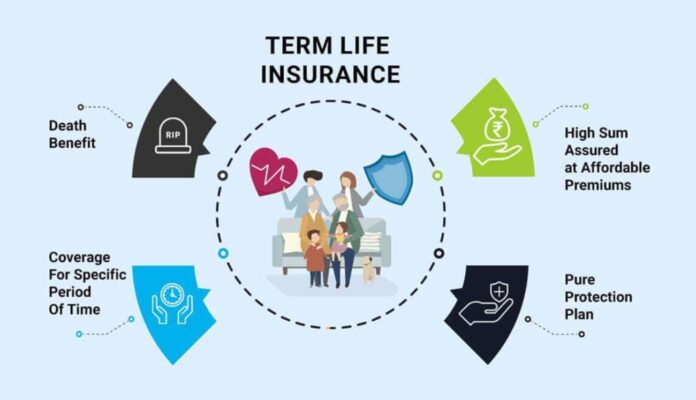The Economic Survey 2022-23 found that most Indians buy life insurance for savings and not for protection. This is a worrying trend, as life insurance’s main motto is to provide financial security for your family during your death.
Term insurance is a type of life insurance variant providing coverage for a specified term. This benefit ensures financial stability for the beneficiaries, should the worst occur during the policy term.
In this article, we will explore the main advantages of term insurance:
Affordability for high coverage
Temporary coverage for specific needs
Customization feature
With these attributes, term insurance serves as an essential safeguard for your loved ones, providing peace of mind amidst life’s uncertainties. Let’s discover how term insurance benefits are a crucial component of your financial strategy.
Top Benefits of Term Insurance
Affordable Premiums for Higher Coverage
One of the most enticing aspects of term insurance is its cost-effective nature. Compared to other types of life insurance, such as whole life or universal life, term insurance stands out due to its affordability.
Consider an example where a 30-year-old non-smoker opts for a term policy with a sum assured of 1 crore. The premium for such high coverage is surprisingly low, making it a popular choice among young professionals who seek to secure their families’ futures without significantly impacting their present lifestyle.
This high coverage at affordable premiums ensures that their dependents are provided a substantial financial cushion in the unfortunate event of a policyholder’s untimely demise. This helps them maintain their standard of living, repay debts, and meet other financial obligations.
Flexibility and Customization
Term insurance offers key benefits due to its flexibility, allowing customization of policy length, coverage amount, and riders, making it a versatile tool for various financial needs. Policyholders can choose the policy duration per their requirements – typically ranging from 5, 10, 20, to even 30 years.
Moreover, term insurance provides the flexibility to tailor coverage based on an individual’s needs and financial goals. Policyholders can opt for add-ons or riders, such as critical illness cover, disability cover, etc., to enhance their policy’s scope.
Temporary Coverage for Specific Needs
Term insurance, as the name implies, provides temporary coverage for specific needs. Its fixed-term nature is ideally suited to protect financial responsibilities with a definite endpoint.
Protecting a Mortgage: A home loan for 20 years is equivalent to a term insurance policy of the same duration. It can ensure that your loved ones aren’t burdened with mortgage payments should anything happen to you during the loan tenure.
Covering Education and Marriage Expenses: If you have children, a term insurance plan can provide for their education or wedding expenses should anything happen to you.
Settling Personal Loans: Personal liabilities like car loans can also be covered with term insurance, ensuring your dependents aren’t burdened with your debts.
Safeguarding Business Liabilities: Entrepreneurs can leverage term insurance to protect their liabilities, ensuring business continuity in the unfortunate event of their demise.
Compared to other temporary coverage forms, term insurance provides unparalleled coverage. It provides significant coverage at a fraction of the cost, making it an excellent option for individuals at different stages of life.
Factors to Consider When Choosing Term Insurance
There are a few key considerations when choosing a term insurance policy:
Age and Health Impact on Premium Rates
The younger and healthier you are, the lower your premium. Therefore, buying term insurance when you are young is often advantageous.
Importance of Accurately Assessing Coverage Needs
When deciding your coverage amount, it’s crucial to consider your financial obligations, debts, dependents’ needs, and lifestyle expenses.
Understanding Policy Renewal and Conversion Options
Some term insurance policies have the option of renewal or conversion to a permanent policy. Understanding these options can provide flexibility and assurance for your future.
Addressing Common Misconceptions
A few misconceptions about term insurance often deter individuals from considering it. Let’s debunk some of these myths.
“Term insurance is wasted money if I don’t die during the term.”
Many people believe that if they outlive their term insurance policy, the premiums paid are wasted. But the term insurance aims to secure your loved ones financially in case of your untimely demise. It is a safety net that gives an invaluable piece of mind.
“I can’t convert my term policy into permanent coverage if needed.”
Several term insurance policies offer conversion riders, allowing you to convert your term policy into a permanent one without undergoing a medical exam. This is especially beneficial as you age or if your health deteriorates.
“Term insurance is only suitable for young and healthy individuals.”
While it’s true that premiums are lower for younger and healthier individuals, term insurance still provides significant value for older individuals or those with health issues. It offers high coverage at a lower cost than most other life insurance options.
Conclusion
As discussed, term insurance has numerous advantages in every life stage – young, old, good, or bad health. It acts as an ace player in your financial ground with substantial protection for you and your loved ones.
It is necessary to understand that term insurance purchases depend entirely on specific financial needs and objectives. You must supplement it with thorough research and comparing the market’s available term insurance plans.
Lastly, it is essential to comprehend the significance of term insurance in our financial planning. Ultimately, a complete financial plan includes adequate protection.
Remember to remain informed and protected and carefully plan for a prosperous future.




































